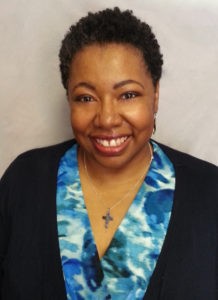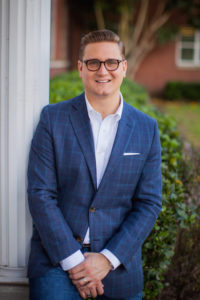A small group of Baptist ministers is exploring ways to apply historically Catholic spiritual formation disciplines to the work of racial reconciliation.
The exploration is based on the belief that those ancient practices, such as meditation and contemplative prayer, can foster the deep, considerate discipleship needed to address the difficult task of social justice without resorting to resentment and acrimony.
“You can’t have hard conversations about race and justice unless you are willing to be open to the Holy Spirit and to look inward,” said Phaedra Blocker, director of programs at the New Baptist Covenant.

Phaedra Blocker
Blocker oversees the organization’s Covenants of Action program, which pairs Baptist churches from different racial and ethnic backgrounds to address the pressing needs in their communities.
Issues or causes around which existing covenants have been established include predatory lending, education, poverty and civil rights.
“We don’t proscribe what people do,” Blocker said about the congregations and their joint ministries. “We try to encourage them to do what organically comes out of their context and environment.”
For one Baptist minister in the Sunshine State, that context is the thorny issue of racial reconciliation.
“It’s a long-game approach to justice and reconciliation because it begins with spiritual formation, and justice will happen out of the overflow,” said Alex Gallimore, the senior pastor at Bayshore Baptist Church in Tampa, Florida.
‘Discerning the will of God’
A Covenant of Action centered on spiritual formation would be a first for the New Baptist Covenant, Blocker said.
The inspiration behind the idea originated with Gallimore’s participation in a two-year formation process through the Transforming Center, a Chicago-based organization that encourages congregations to apply spiritual formation principles to fulfill their callings.
The center begins with cohorts of clergy and lay leaders who attend workshops, retreats and mentoring programs designed to transform the lives of participants. They, in turn, are taught how to apply those lessons and experiences in their home congregations.
“Their main goal is to invite members on a journey of transformation that will cause them to be conformed in the image of Christ for the sake of others,” said David Hughes, a former pastor of First Baptist Church in Winston-Salem, North Carolina, now on staff at the Transforming Center.

David Hughes
“Members of cohorts will experience a series of spiritual practices over time that will offer a set of sacred rhythms,” he said.
The premise is that Christians transformed into disciples in Christ’s image are better equipped to participate in movements and processes for social justice and other causes.
“The original vision of the center is to cultivate churches that would be centers of spiritual transformation,” Hughes said.
Thus, practices such as contemplative prayer and contemplative scripture reading, silence and meditation can have direct, if not immediate, impacts on individuals, congregations and neighborhoods.
“It’s about how can we actually discern the will of God around a given question or around a big decision,” he said.
‘It seems very Catholic’
Gallimore said his participation in a cohort through the center changed him as a Christian and as a pastor.
“I did my formation at a Franciscan monastery doing a lot of Ignatian spiritual practices,” he said.
He has since started introducing elements of that work into his congregation, first through other leaders.

Alex Gallimore
“The staff and I did a spiritual formation process together,” he said.
The liturgy of the hours – a form of hourly, formal prayer – is prayed in the church on Wednesdays and worship includes periods of intentional silence.
“We are bringing this to the pews.”
But Gallimore, and leaders at the center, know there is often reluctance and sometimes outright opposition to the use of ancient spiritual formation techniques, especially in Baptist circles.
“A lot of it seems very Catholic – and a lot of it is,” Gallimore said.
But Bayshore has been open to the practices, in part because it’s an ecumenically diverse congregation through the marriages of some of its members.
Gallimore said he has led classes on spiritual formation approaches, and that the liturgical calendar is followed. The Stations of the Cross and the Last Words of Jesus services are alternately practiced each Lent.
The association with Roman Catholic practices should not dissuade their application by Protestants, Hughes said.
“These are practices that have been valued more openly by the Catholic church until last the 30 years, but we would say the Catholic church didn’t make them up, either,” he said. “Like a fixed hour of prayer – we believe Jesus and the disciples practiced that.”
Many Protestants are fearful such traditions represent a rejection of the belief in salvation by faith. But these are not efforts to earn salvation, Hughes said.
“They don’t do anything but give God the opportunity to do what he needs to do inside us.”
Besides, Baptists and other Protestants have plenty of traditions and practices of their own, though rarely identified as such.
“Attending church is a practice that in our own Baptist tradition is viewed as very important,” he said. “Bible study is also an important spiritual practice in the Baptist church.”
The power of silence
In Tampa, Gallimore said he’s already seen how spiritual formation can have positive influences in tough issues like racial reconciliation.
A few such approaches were included in efforts by Bayshore Baptist and a partner African-American church after the violent protests Charlottesville, Virginia, in 2017.
They’ve held panels on how to approach the challenge without debating the issues, especially by allowing people to speak without response.
“It was just listening to stories and experiences in a reflecting, spiritual way,” Gallimore said.
“It was powerful. People were able to engage in race relations in ways they had not before.”
Gallimore said it’s confirmed belief in the idea of churches being centers of formations in their communities.
Altogether, it’s about listening more than speaking as Christians, he said.
“Silence to me is the most spiritual and powerful and sophisticated form of prayer because in silence we are actually listening to what God has to say,” he said. “We are listening to the words of the spirit.”
When the community does that listening together, it becomes a group spiritual direction practice, Gallimore said.
That, in turn, begins to positively shape the way individuals and the congregation understand and embrace the world and others around them, he said.
“It leads people to engage in social issues collaboratively, without going into our default corners.”
